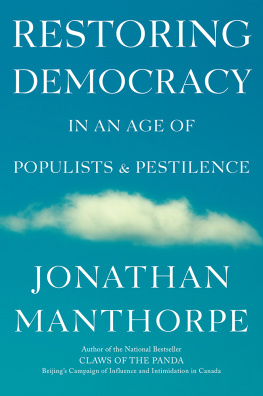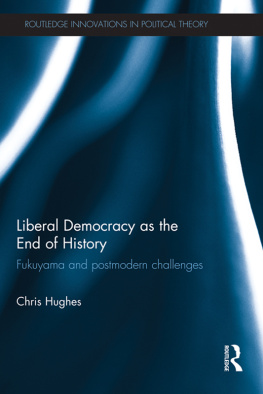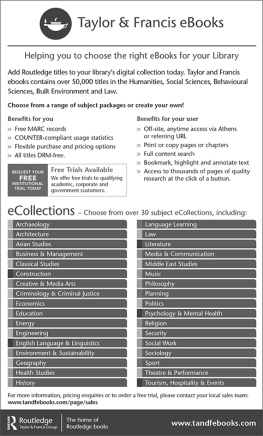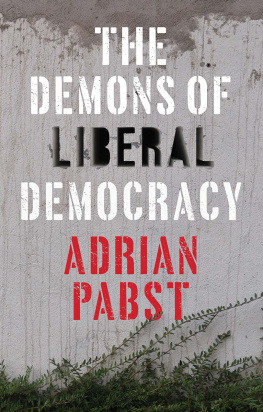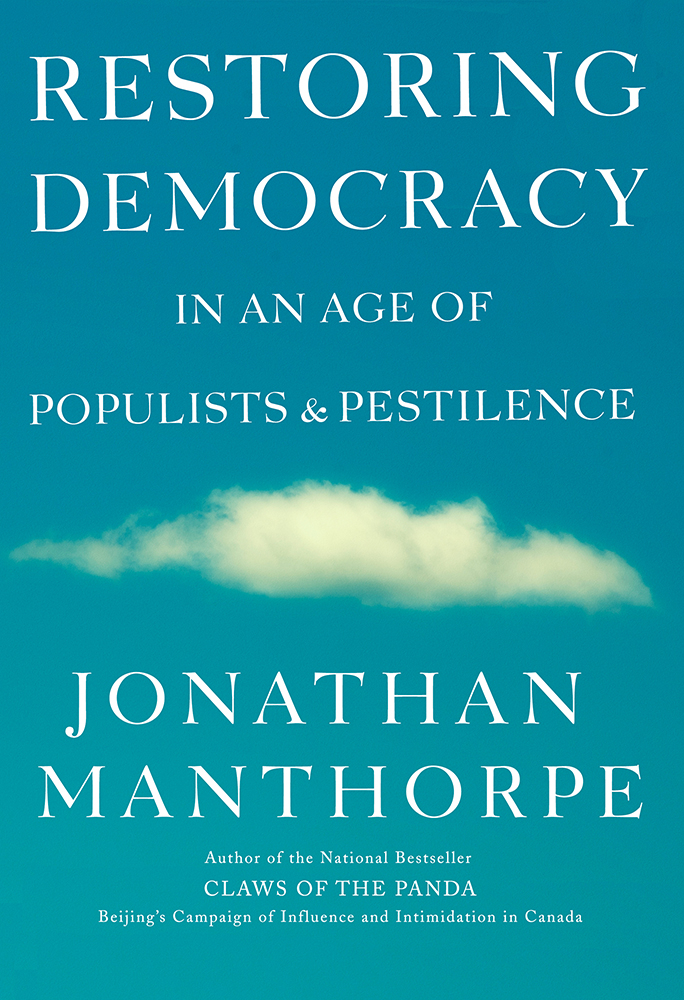RESTORING
DEMOCRACY
RESTORING
DEMOCRACY
IN AN AGE OF
POPULISTS & PESTILENCE
JONATHAN
MANTHORPE

Copyright 2020 Jonathan Manthorpe
This edition copyright 2020 Cormorant Books Inc.
This is a first edition.
No part of this publication may be reproduced, stored in a retrieval system or transmitted, in any form or by any means, without the prior written consent of the publisher or a licence from The Canadian Copyright Licensing Agency (Access Copyright). For an Access Copyright licence, visit www.accesscopyright.ca or call toll free 1.800.893.5777 .

The publisher gratefully acknowledges the support of the Canada Council for the Arts and the Ontario Arts Council for its publishing program. We acknowledge the financial support of the Government of Canada through the Canada Book Fund (CBF) for our publishing activities, and the Government of Ontario through Ontario Creates, an agency of the Ontario Ministry of Culture, and the Ontario Book Publishing Tax Credit Program.
LIBRARY AND ARCHIVES CANADA CATALOGUING IN PUBLICATION
Title: Restoring democracy in an age of populists and pestilence / Jonathan Manthorpe.
Names: Manthorpe, Jonathan, author.
Identifiers: Canadiana (print) 2019024061x | Canadiana (ebook) 20190237295 |
ISBN 9781770865822 (softcover) | ISBN 9781770865839 ( HTML )
Subjects: LCSH : Democracy. | LCSH : Populism.
Classification: LCC jc423 . m36 2020 | DDC 321.8 dc
Cover photo and design: angeljohnguerra.com
Interior text design: Tannice Goddard, tannicegdesigns.ca
Printer: Friesens
Printed and bound in Canada.
CORMORANT BOOKS INC.
260 Spadina Avenue, Suite 502, Toronto, on, M5T 2E4
www.cormorantbooks.com
While writing this book I always kept in mind my three grandsons, Edmund, Hereward, and Fen Manthorpe. It is their generation that will have to confront and resolve the issues I have raised here, and doubtless many more besides. Apart from the thoughts and observations in this book, all I can offer them is the benediction in Mashonaland for someone setting out on a journey Mufambe Zvakanaka: Travel Well.
Contents*
INTRODUCTION /
CHAPTER ONE
Brave New World /
CHAPTER TWO
Letting the Gini Coefficient Out of the Bottle /
CHAPTER THREE
What About the Workers? /
CHAPTER FOUR
The Clash Between Liberalism and Democracy Lets /
Loose the Populists
CHAPTER FIVE
God, Race, and Country /
CHAPTER SIX
The Smell of the Greasepaint, the Roar of the Crowd /
CHAPTER SEVEN
The Roar of the Greasepaint, the Smell of the Crowd /
CHAPTER EIGHT
Orthodoxy, Autocracy, Nationality /
CHAPTER NINE
From the Four Basic Principles to the Chinese Dream and /
the COVID-19 Nightmare
CHAPTER TEN
Back to the Future /
CHAPTER ELEVEN
Trolls, Bots, and Deepfakes /
CHAPTER TWELVE
Twilight of the Demagogues /
CHAPTER THIRTEEN
Restoring Democracy /
EPILOGUE /
ACKNOWLEDGMENTS /
INDEX /
*These page numbers correspond to the print edition 978-1-77086-582-2
Introduction
THIS IS GOING to be a fast gallop over heavy ground. In a few thousand words and a handful of chapters, I am going to set out what I think has gone wrong with liberal democracy in the last forty years. But this is not a book about failure. It is a book about hope. The threats to democracy can be beaten off and reversed.
Because they seek to respond to the views and expectations of their citizens, liberal democratic societies are inherently adaptable and resilient. But some of them have drifted, and some are now drifting; they risk tipping into the ditch of despotism or worse. They can and must be refashioned to function and thrive in the new age that has been thrust upon us. There will not be one uniform solution. Each nation is going to have to find salvation built upon the foundation of its individual history, culture, and aspirations, as well as how it has come out of the pandemic socially and economically. COVID-19 has changed the rules of many games, but it is also a reminder of what is of value in human communities, what is essential to making them flourish, and what is mere frippery. The timing of the pandemic and the insights it has provided ought to enliven the quest to restore democracy. It is a challenge that must be embraced with excitement and exhilaration. It is an adventure that should be approached with an entirely open mind for the almost infinite possibilities available for the construction and protection of modern democratic frameworks. This exploration will require courage, perseverance, and a clear understanding of what has gone wrong in the last four decades.
The factors I consider important in the erosion of democracies are my own selections, based on my fifty-five years in journalism. My experience in North America, Europe, Africa, and Asia has given me the opportunity to see up close how democracies are created, what sustains them, why some fail to survive, and the tricks despots use to destroy them. I make no claim that the events Ive written about are exhaustive or the best ones to illustrate the situation. They do, however, illuminate my concerns. I have chosen to focus on the challenges to democracy in the countries of Europe and North America. My purpose is two-fold. Taking into account the widely differing cultural contexts in other democracies threatened by populism, such as Brazil, India, or the Philippines, would widen the lens too much, and the narrative would lose focus. Examples of the kinds of threats to democracy evident worldwide are to be found throughout the North Atlantic. In my career as a journalist and, more pertinently, as a foreign correspondent and international affairs columnist since 1979 in Europe, Africa, Asia, and North America, I have been in the front row as many of the events described in this book unfolded. My judgments and selections may be open to criticism, but they were come by honestly.
One of humanitys less attractive traits is a passion for gloom and doom. All too often, people see the cloud on the horizon and not the otherwise flawless blue sky above. The tendency to focus only on the negative is a real danger in these times of political turmoil and uncertainty. Paranoia can become self-fulfilling. We face an unceasing barrage from talking heads and political strategists warning us that democracy and its accompanying virtues of liberalism, tolerance, and communal cohesion are under immediate threat from the forces of authoritarianism, hatred, and tribalism. There are indeed threats to modern democratic liberalism from within and without, just as there have always been since it emerged out of Western Europes Age of Enlightenment three and a half centuries ago. There is, however, nothing inevitable about the victory of populists, despots, and demagogues, no matter how fertile the ground may be for them. Far from it.
The concept of liberal democracy has always contained contradictions and fundamental differences of opinion about its philosophy, even among its most avid supporters. During most of the twentieth century, those contradictions were sidelined by the greater battles between democratic liberalism and first fascism and then communism. But with the end of the Cold War and the collapse of the Soviet Union, the fallibility and conflicts within liberal democracy have not only bubbled to the surface, they are threatening to erode the whole structure of what I think of as North Atlantic culture. The threats include the emergence of intellectually detached and socially isolated ruling classes that span politics, government, business, academia, and the media. Accompanying that isolation are gross disparities of wealth. This has produced entire communities beached by technological advances and changing patterns of commerce while, according to Oxfam, 1 percent of the worlds population 75 million people holds half the worlds wealth, making them richer than the other 7.4 billion people.

